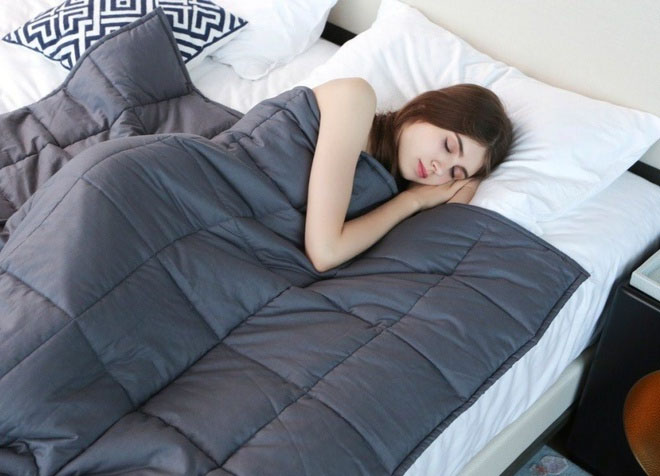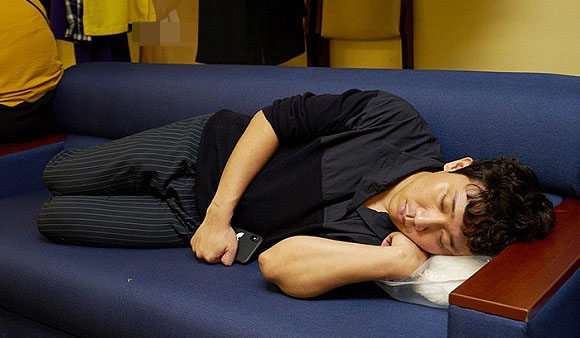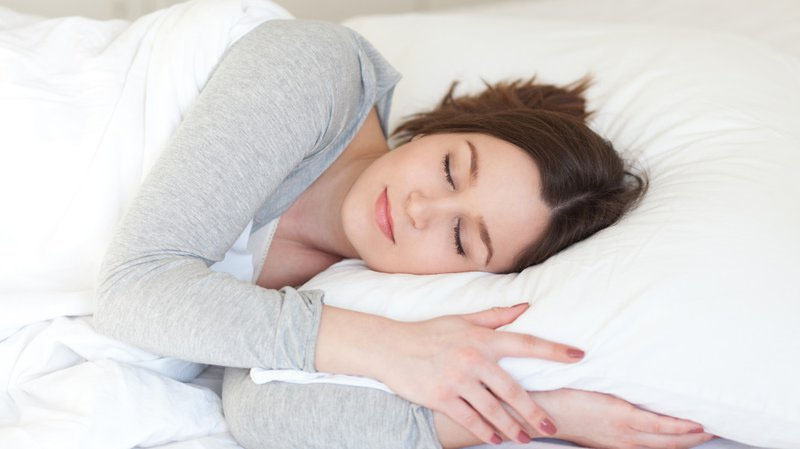Here are some effective ways to combat insomnia at night. If you often have trouble falling asleep, try these methods and see which ones work best for you.

Use a Thick Blanket
Research shows that a cozy blanket is not only comfortable but also makes you feel secure and helps you fall asleep easier. Using a thick blanket can miraculously increase the production of serotonin, one of the sleep-inducing chemicals. The act of covering oneself with a blanket applies pressure to specific points on the body, triggering the brain to produce serotonin. This is why many people like to use blankets even when the weather is hot.

Buzzing Breath
If you can’t sleep well at times, learn from the buzzing of bees. All you need to do is breathe and then create a buzzing sound as you breathe out – this is the Hornet breath technique. Sleep experts say that this breathing technique can help you relax and get rid of negative emotions.
Acupressure and Muscle Relaxation
Try pressing your muscles; if they are too tense, it will keep you awake, but if they are relaxed, you will surely feel more comfortable and fall asleep easier. Apply moderate pressure to specific parts of the body by pressing with your fingers. For example, you can press your thumb into the Yintang point between your eyebrows for 2 to 3 minutes, and the feeling of sleepiness will appear immediately, or press the point between the first and second toes of the right foot in the same way.
For muscle relaxation, start by pressing your fingers and then relaxing them. Then, move on to your wrists and forearms, elbows, and other movable parts; before long, your breathing will become deeper, and you will fall asleep.

Splash Cold Water on Your Face
Soaking your face in ice-cold water will initially make you feel more alert. But after a while, the cold water will reboot your nervous system, and the low temperature will also trigger a physical response that lowers your blood pressure and heart rate, helping your body relax and removing fatigue, allowing you to fall back asleep.
Try to Stay Awake
When you deliberately try to stay awake, your brain will work against you and make you fall asleep faster. This phenomenon is called the sleep paradox. Psychotherapist Julie Hirst explains that when you keep your eyes open and tell yourself that you don’t want to sleep, you will find it easier to fall asleep because the brain doesn’t process negative sentences well, and you are more likely to interpret them as instructions to sleep.

Change Your Sleeping Spot
When you can’t fall asleep no matter what you do, try changing your sleeping spot, like moving to the sofa or finding another bed to lie on. It may help you relax. If there is nowhere else to sleep, turn over and rest your head at the foot of the bed. The brain may fall asleep better due to the change in position.

Roll Your Eyes
Some people find that rolling their eyes can help them fall asleep more easily. Close your eyes and try to breathe slowly, then roll your eyes up and down, and you will feel your body gradually relaxing. Moving your eyes in this way a few times helps stimulate the sleep hormone melatonin, making you feel sleepy.
Recall Your Day
Try to remember and list what you did today, what you ate for dinner, how you got home from work, what happened on the way, and what you did afterward. Thinking back on these small details is usually boring enough to make you want to sleep.
Practice the 4-7-8 Breathing Technique
This breathing technique is derived from yoga and can relax your nervous system, not only helping you fall asleep immediately but also improving your mood and reducing stress.

After lying down, touch the tip of your tongue to the upper part of your mouth and breathe out strongly and quickly through your mouth, as if you were fogging up a mirror. Then, close your mouth and gently breathe in through your nose, counting to 4. Next, hold your breath and count to 7. Do this again, breathing out completely through your mouth for 8 seconds. Repeat the cycle three more times for a total of four breaths. This will slow your heart rate and release chemicals in your brain that calm your mind and make it easier to fall asleep.
Light a Scented Candle
Researchers have found that people who smell lavender before bed or at night have fewer sleep problems. You can light a scented candle or place some lavender in your bedroom to see if this method works for you.

Blow Bubbles
In the middle of the night, if you can’t sleep and don’t know what to do, try blowing soap bubbles. This will make you take deep breaths, which will help you get rid of personal worries before falling asleep and make you feel more comfortable and sleepy.
Exercise
You don’t need to do anything fancy or follow a strict routine. Just do a few simple shoulder stretches before bed to relax your body. Curl your feet down to your knees and then release, breathe, and curl your calf muscles, then your thighs, buttocks, abdomen, chest, and arms… massage to reduce pressure and gradually relax your muscles. This will not only reduce muscle tension but also make you feel tired, helping you fall asleep faster.

Place a Pillow Under Your Knees
If you can’t fall back asleep after tossing and turning, try placing a pillow under your knees. The pillow will support your body and help you relax in bed, and your lower back will maintain the natural curve of your spine. If you sleep on your side, place a pillow between your knees and under your shoulder to relax your body and feel more comfortable and sleepy.
Breathe Through Your Left Nostril
Can’t sleep? Lie on your left side, close your right nostril with your finger, and then start breathing slowly and deeply through your left nostril. This yoga technique is believed to lower blood pressure and calm a person.

By V.K – Vietnamnet
































